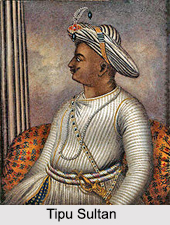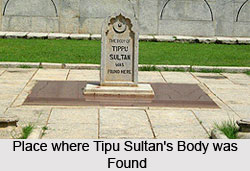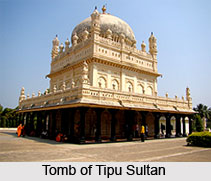 Tipu Sultan, Hyder Ali"s elder son, succeeded to his father"s throne on 29 December 1782, at the age of 32. Tipu Sultan was born in November 1750 and was called the "Tiger of Mysore". Tipu Sultan was the first son of Hyder Ali and his second wife, Fatima or Fakhr-un-nissa. Tipu was named as Sultan Fateh Ali Khan Shahab or Tipu Saheb. Apart from being a brilliant ruler, Tipu was also a scholar, poet, soldier and a staunch Muslim.
Tipu Sultan, Hyder Ali"s elder son, succeeded to his father"s throne on 29 December 1782, at the age of 32. Tipu Sultan was born in November 1750 and was called the "Tiger of Mysore". Tipu Sultan was the first son of Hyder Ali and his second wife, Fatima or Fakhr-un-nissa. Tipu was named as Sultan Fateh Ali Khan Shahab or Tipu Saheb. Apart from being a brilliant ruler, Tipu was also a scholar, poet, soldier and a staunch Muslim.
After his enthronement, Tipu was immediately immersed in the struggle against the English, continuing the war that had begun under his father and in which he had already taken a vigorous part. Tipu occupied the throne at a time when Mysore was fighting the crucial Second Mysore War with the British. The war ended in 1784 when Tipu Sultan and the English signed the Treaty of Mangalore. As per the treaty, both sides agreed to return the territories and the prisoners captured during the war. A war with the Marathas and the Nizam soon followed (1785-87) ending with military successes but with rather disadvantageous terms of peace. This was apparently because of Tipu"s anxiety that these two powers should not combine with the English, whom he consistently regarded as his principal enemy.
From his accession Tipu treated himself as an independent sovereign, not needing any diploma of inferior office from the Mughal court at Delhi. He, thus, dropped the name and title of the Mughal emperor from his coins, and started using the title "Padshah" for himself from January 1786. Tipu could now claim parity with full-fledged sovereigns, like the Sultan of Turkey and the King of France, both of whom personally received his ambassadors in 1787 and 1788. While these embassies might not have resulted in any substantial material support for him, in respect of either military resources or commercial advantage, the diplomatic stature gained by him certainly reinforced his prestige at home.
Though the titles of "Padshah" or "Zill-i Ilahi" (Shadow of God) were used by the Mughal emperors, but Tipu gave to his sovereignty a colour of religious militancy, which was not at all present in the Mughal imperial polity of the eighteenth century. Tipu would not put his own name on the coins he minted; rather the coin legends invoke God as the all-powerful Sovereign, and bring in the name of Muhammad the Prophet, and of Hyder.
Tipu Sultan was a lover of art and culture. His palace at Srirangapatnam is known for its superb ornamentation. He minted a vast variety of coins from different mints. During his reign, French craftsmen worked in Mysore. One such artisan produced a wooden toy showing a tiger attacking a Britisher. The toy is now in the Victoria and Albert Museum, London. Like his father, Tipu too was buried at Srirangapatnam. Tipu Sultan was a tolerant ruler in the tradition of Islamic tolerance.
Tipu Sultan"s reforming zeal touched every department of life, including coinage and calendar, banking and finance, weights and measures, agriculture and industry, trade and commerce, morals and manners as well as social and cultural life. He built many strong forts such as the Doorg in Nilgiris to defend his kingdom. He had a quest for seeking knowledge. His personal library consisted of more than 2000 books in different languages. He had a dignified personality and impressed the people he came into contact with. He was an enlightened ruler who treated his non-Muslim subjects with tolerance generally. He conferred liberal grants to Singeri, Srirangapatnam and Mangalore temples.
The innovative ideas of Tipu Sultan enabled Mysore to gain importance even in the international spheres.
Tipu Sultan proceeded actively to rebuild the navy that Hyder had established. His major interest was in building ships which could be used for trade, though, being armed for defence, as was usual with merchant ships of the time, these could also be used in naval action. This embassy, really consisting of a board of four officers, had both diplomatic and commercial objectives. Moreover, Tipu was also looking beyond the Indian Ocean, and wished to open his own direct shipping line to Europe. In 1787, he proposed to send to France a ship with four hundred Indians aboard along with his embassy.
Apart from the constructive operations of Tipu also had to undergo several critical situations that took place due to his relation with the British. In 1783 Tipu directed the compilation, through Zainul Abidin Shustari, of a manual of mili¬tary organization and tactics, he significantly titled it Fathul Mujahidin, the Victory of Holy Warriors. This Holy War was to be directed against the English. In the instructions that he penned for his envoys to Constantinople he drew a picture of how the English had become a grave danger by their conquests and acquisitions. It is the English who, despite the dictates of Muslim theology to the contrary, were held to be infidels, the major enemy of Islam. All other enmities were secondary; all friendships were to be defined on this primary basis. His government, though strict and arbitrary, was the despotism of a politic and able sovereign, who nourishes, not oppresses the subjects who are to be the means of his future aggrandizement. His cruelties were, in general, inflicted only on those whom he considered as his enemies.
 Tipu Sultan, Mysore"s last independent ruler, was distinctly an alternative element in late eighteenth-century South Asian political culture. Unlike the nominally independent Nizam Ali Khans, Asafuddaulahs, Nana Fadnavis or other princes and states¬men of an age when colonialism was destroying the Indian ancient regime brick by brick, Tipu, like his father Hyder Ali and his northern contemporary Mahadaji Sindhia, refused to be pliant and complaisant about British diplomatic blandishments allied with military threats during the age from Warren Hastings to Wellesley. Plebeian in his social origins, more of a ghazi than the average feudal carpet-knight, he was a throwback to the pre-Mughal Deccan Sultan, seeking accept¬ance of his imperial aspirations from West Asian and continental Euro¬pean peers, so as to effectively challenge British Indian competition for dominion in South India. More than any other indigenous ruler in eighteenth-century India, Tipu was interested in state power and its commercial capacity. But more than any of them, except his father and Mahadaji, he recognized the need to fight for it. He did this in a pragmatic way, using French absolutist alliance, Jacobian ideology, as well as the neo-Madari principles of a shaheed, without any scruples of artificial consistency, or ideological purity.
Tipu Sultan, Mysore"s last independent ruler, was distinctly an alternative element in late eighteenth-century South Asian political culture. Unlike the nominally independent Nizam Ali Khans, Asafuddaulahs, Nana Fadnavis or other princes and states¬men of an age when colonialism was destroying the Indian ancient regime brick by brick, Tipu, like his father Hyder Ali and his northern contemporary Mahadaji Sindhia, refused to be pliant and complaisant about British diplomatic blandishments allied with military threats during the age from Warren Hastings to Wellesley. Plebeian in his social origins, more of a ghazi than the average feudal carpet-knight, he was a throwback to the pre-Mughal Deccan Sultan, seeking accept¬ance of his imperial aspirations from West Asian and continental Euro¬pean peers, so as to effectively challenge British Indian competition for dominion in South India. More than any other indigenous ruler in eighteenth-century India, Tipu was interested in state power and its commercial capacity. But more than any of them, except his father and Mahadaji, he recognized the need to fight for it. He did this in a pragmatic way, using French absolutist alliance, Jacobian ideology, as well as the neo-Madari principles of a shaheed, without any scruples of artificial consistency, or ideological purity.
Due to the constant strife with the British resulted in the capturing Bangalore by the British. They finally defeated Tipu near Srirangapatnam (Seringapatam).The Third Mysore War ended with the Treaty of Srirangapatnam concluded between Mysore and the English in 1792. As per the treaty, Tipu was forced to surrender half his kingdom which the English, the Nizam and the Marathas divided this territory between themselves. Unlike many other natice Indian rulers, Tipu Sultan, consistently refused to accept the over lordship of the British. On the contrary, he wanted to chase the British out from India. For this, he tried to secure help from France. In fact, Tipu trained his soldiers with the help of the French. He also sent envoys to Afghanistan, Arabia and Turkey.
By now Wellesley succeeded Cornwallis as the Governor-general in India. Wellesley did not like the presence of French advisores in Tipu"s court. The English declared war on Tipu in 1799. General Harris and Arthur Wellesley (the brother of the Governor-general) attacked Mysore. A British force from Bombay also attacked Mysore. Tipu was defeated at Malavalli. He died on 4th May 1799. Later, most of Tipu"s dominions were shared by the English and their ally, the Nizam of Hyderabad. A small part of the Mysore kingdom was restored to Krishna, a member of the old Hindu royal family from whom Hyder Ali had captured the throne of Mysore.
Clearly, then, whatever Tipu wanted to do, he did not want to make war on the bulk of his own subjects. On the contrary, despite undoubted constraints, he was driven by a desire to improve the conditions of his people and thereby add to his own resources.






































